READER COMMENTS ON
"'Send Lawyers, Peace, and Money': New Hampshire Election Contests Get Technical, Testy Before They Even Begin"
(68 Responses so far...)
COMMENT #1 [Permalink]
...
Jukka Haapakoski
said on 1/15/2008 @ 5:15 am PT...
Supposing that the lawyers, money and peace fail in the effort to bring more transparent elections, how about sending in the people?
The idea would be to organise a shadow election in each voting district by grassroots non-partisan affiliates at the same time as the official elections are held. The electorate would simply be asked to vote on paper for the candidate that they had chosen for the official election. This way the accuracy of the results could be verified by independent observers.
Perhaps it's too late, but it may be worth the effort.
COMMENT #2 [Permalink]
...
Dredd
said on 1/15/2008 @ 5:44 am PT...
I reiterate that the chain of custody of existing evidence (a.k.a. paper ballots) is the ultimate consideration at this time.
In this I concur with no less than Bev Harris.
In cases where factual questions are said to be considered by the highest logic, most advanced evidentiary processes, and greatest exclusion of bias (the American trial court) chain of custody of evidence is a fundamental requirement.
Without a valid chain of custody there simply is no valid evidence, which in this case would mean there are no paper ballots:
the once simple task of examining and recounting paper ballots --- where they still exist, as they do in New Hampshire
(Brad Sedd).
Therefore unless the chain of custody is bona fide the paper ballots are no better than DRE, and legally do not exist.
Democracy or democrazy turns on the bona fide evidence or the lack thereof.
I can print out for you any number of NH paper ballots at any time of day or nite ... so long as I have a good grade computer and printer.
Think counterfeit vs bona fide and what makes each what it is or isn't.
COMMENT #3 [Permalink]
...
Big Dan
said on 1/15/2008 @ 6:55 am PT...
"these "recounts" could be like no other, in the history of the country..."
So, NH is an "opportunity" to shed light on "counting the votes" early in the primary, great job! Maybe even better because it's a small state (?)... like a "test"...later for other states!
COMMENT #4 [Permalink]
...
Reader
said on 1/15/2008 @ 7:14 am PT...
They're charging 24 cents for each ballot?! That's almost a dollar for every 4 ballots. What a crock. As was said, this election generates billions of dollars for NH. Oh well, way to stand up Obama and Edwards.
COMMENT #5 [Permalink]
...
Badger
said on 1/15/2008 @ 7:29 am PT...
Each candidate is being charged the full price of the recount?
If you have two candidates calling for the same thing, they're not going to do it twice, are they?
This will be a FULL recount, right? Not just counting the votes for Howard and Kucinich, but EVERY vote cast for EVERY candidate?
COMMENT #6 [Permalink]
...
Floridiot
said on 1/15/2008 @ 7:45 am PT...
It looks to me like a partia-full recount.
It also looks like they have been burying the evidence for so long that they don't even know how to preform an honest one...we'll see
COMMENT #7 [Permalink]
...
Jim
said on 1/15/2008 @ 7:45 am PT...
Sounds like a government of the 'dollar', by the 'dollar', for the 'dollar'
COMMENT #8 [Permalink]
...
Big Dan
said on 1/15/2008 @ 7:46 am PT...
COMMENT #9 [Permalink]
...
Jim
said on 1/15/2008 @ 7:56 am PT...
Too Funny, the NH law for "PROVISIONS FOR PURITY OF ELECTIONS" is Statute chapter 666!
COMMENT #10 [Permalink]
...
Savantster
said on 1/15/2008 @ 7:58 am PT...
I was listening to NPR and a straw poll .. people talking about how Obama and Edwards were "stand up guys".. yet, neither is here helping prove the efficacy of our elections, and they could be saving some true patriots a LOT of money.. Yet, for the "fear of the stigma of speaking up, the fear of the political damage", these "stand up guys" are content to hope like hell they can "pull it off"..
So much for "bright" or "stand up".
I can't believe the people of NH are standing for this. I can't believe we don't have some people like Soros aren't out there paying this bill.. I can't believe the sheeple are that far gone.. It's a sad day for America.
COMMENT #11 [Permalink]
...
Jim
said on 1/15/2008 @ 8:08 am PT...
I'm no lawyer & I might be missing something, but if you read the statute at http://www.sos.nh.gov/rsa660.htm section 660:7 regarding "State or Presidential Primary Recounts".
I don't see it written anywhere about the 24 cent cost per ballot recounted. Can anyone enlighten me?
COMMENT #12 [Permalink]
...
BB
said on 1/15/2008 @ 8:13 am PT...
Maybe our defenders of democracy can draw a lesson from the meltdown in credit markets in recent months. Market confidence in highly complex derivative securities based on mortgage loans has collapsed, along with confidence in the capability and even integrity of rating agencies sanctioned to evaluate those securities.
In the early 1930s, William O. Douglas once stated "Confidence is the bulwark of capitalism, as it is of democracy." These are words worth carrying around.
COMMENT #13 [Permalink]
...
Jim
said on 1/15/2008 @ 8:14 am PT...
Whoops, just found it myself!
660:2 IV. If the difference between the vote cast for the applying candidate and a candidate declared elected shall be greater than 3 percent of the total votes cast in the towns which comprise the office to be recounted, the candidate shall pay the fees as provided in RSA 660:2, III and shall agree in writing with the secretary of state to pay any additional costs of the recount.
Please disregard previous post.
Seems geared to discourage losers by wide margin from rocking the apple cart.
COMMENT #14 [Permalink]
...
lysias
said on 1/15/2008 @ 8:50 am PT...
Is it possible to do a new, after-the-fact exit poll in which voters in NH are asked how they voted in the primary? Presumably, polling experts could determine what kind of sample would be needed to have a tiny margin of error.
COMMENT #15 [Permalink]
...
Steve B
said on 1/15/2008 @ 8:52 am PT...
New Hampshire should have put all materials,voting machines,documents,and anything else related to the primaries into secure lockdown once it had become apparent that a recount would be requested.
They will have had 9 days to try and make the evidence fit the reported outcome.
My feeling is that there is going to be a lot of evidence that will be inaccessible because it is "proprietary" or just plain "lost".
COMMENT #16 [Permalink]
...
Paul
said on 1/15/2008 @ 9:37 am PT...
Great job of reporting Brad Blog.
COMMENT #17 [Permalink]
...
antichrist
said on 1/15/2008 @ 9:47 am PT...
There will be no recount.
COMMENT #18 [Permalink]
...
Mac at DraftGoreNE.com
said on 1/15/2008 @ 9:52 am PT...
Various thoughts...
This is a full recount of all Dem primary ballots (paid by Kucinich), and all Rep primary ballots (paid by the other guy).
Dredd, much of this is not governed by the standard of the court of law, but the court of public opinion. If the recount doesn't change the results, it proves little (to us). If the results DO change, it will make e-counting "look" REAL bad, even if it doesn't "prove" it is. It's unlikely the MSM will blame it on someone switching the ballots "after" the first count.
Bearing in mind that simple technical screwups could be to blame (and may be more likely), we can at least hope to catch those, or an insufficiently sophisticated hacking attempt. It's worth the money, if we do.
Question: Do we have confirmation that all ballots will be completely hand-counted?
Mac
COMMENT #19 [Permalink]
...
barbara
said on 1/15/2008 @ 10:04 am PT...
This recount isn’t about who won 39% of 36% or even 1%. It’s about establishing whether 100% of the voters had 100% of their votes counted exactly the way they cast them," Kucinich said last week, after questions arose about the apparent come-from-behind win by Senator Hillary Clinton which had stunned pundits and pre-election pollsters who had predicted a substantial win by Senator Barrack Obama.
And until we do away with private companies with complete access to our votes...and 'propritary' codes....we are very far from free and transparent elections.
Brad, I cannot thank you enough for the education that you have been fighting to provide for all of us.
I hope we are capapble of learning...
COMMENT #20 [Permalink]
...
Julie
said on 1/15/2008 @ 10:19 am PT...
When I went to the donation site for Albert Howard it was insecure. That's a problem if we are to raise money for the Republican recount by tomorrow
COMMENT #21 [Permalink]
...
InstantRunoffVoting
said on 1/15/2008 @ 10:35 am PT...
For me the quote from Kucinich's rep. says it all...
"It's ludicrous," charged senior Kucinich campaign representative, David Bright. "New Hampshire has the privilege of being the first in the nation. This election brings in $3 billion dollars to the economy, so you'd think a measly 70k would be part of the cost of doing business,"
I get it now. WTF was I thinking, believing elections were to choose our public representative. In America™®©, elections are just another for profit business.
Thanks to Brad for beings so diligent on this most fundamental of topics, unlike other so called Progressive or Liberal Blogs.
COMMENT #22 [Permalink]
...
Nadia Goodenu
said on 1/15/2008 @ 10:40 am PT...
Thank you Brad!! What would we do without your excellent reports!!
Brad, I'm serious here...we need you in Congress!
www.peacecandidates.com
COMMENT #23 [Permalink]
...
elliott
said on 1/15/2008 @ 10:57 am PT...
We need to look at the "money" trail! Who exactly ushered these machines in so "conveniently" late last year. Someone must know. NH people generally don't put up w/ this shit once we find the culprit(s). My guess is the Greggs or Sununus of this state. We are a lone voice, but keep screaming,...they'll hear eventually!
COMMENT #24 [Permalink]
...
Dredd
said on 1/15/2008 @ 11:21 am PT...
One wonders if the loss of state revenue, due to housing market price decline and therefore pro rata real estate tax revenue decline, inspires the state to charge crazy amounts for a ...
recount?
No, it is not a re-count if they will be counting 80% of them for the first time for real ... instead of on the play-pretend model 666 of Diebold now with the alias "Premier".
How low can election warlords go? When they can't prove a damn thing they should not be allowed to charge for doing what they must by law do right anyway!
COMMENT #25 [Permalink]
...
Emily Levy
said on 1/15/2008 @ 11:23 am PT...
UPDATE ON DONATING TO 'RECOUNT' OF DEMOCRATIC BALLOTS:
The easiest way to donate specifically to the recount efforts is by phone at this number:
(877) 413 3664. We're hearing reports that Act Blue takes a cut of the donations and that the Kucinich campaign site is having trouble with the system that allows people to specify that their donations are for the NH 'recount.'
40 MINUTES UNTIL DEADLINE!
COMMENT #26 [Permalink]
...
elliott
said on 1/15/2008 @ 11:42 am PT...
COMMENT #27 [Permalink]
...
Steve B
said on 1/15/2008 @ 11:43 am PT...
Here is something to consider:
Why do you think that a potentially decisive majority of states are allowed to hold their primaries on Super Duper Tuesday?
It could be because certain things like election fraud can be swept under the rug since the media and everyone else's attention is scattered and most likely the winners will be crowned and the nominees become irrefutable fact.
This is designed to make it next to impossible to determine who the real winners are plus the clock starts ticking toward the conventions and November
and all the dissenters are dismissed as being "conspiracy theorists"
COMMENT #28 [Permalink]
...
Dan
said on 1/15/2008 @ 11:57 am PT...
The recount should be free FRAUD was already proven in the voidind of ron paul vote totals
COMMENT #29 [Permalink]
...
Grizzly Bear Dancer
said on 1/15/2008 @ 12:02 pm PT...
Excellent reporting Brad.
Thank you,
GBD
COMMENT #30 [Permalink]
...
mswhyte
said on 1/15/2008 @ 12:05 pm PT...
I have read your blog with great interest. I am from Ohio and we are in a pre election battle over use of Diebold equipment. We are also watching the events unfold in New Hampshire.
It is not up to politicans to protect our right to vote. That is our job and we need to take it very seriously. Especially when it appears that politicans and business are working to alter the end results.
I have recommended your blog to several of my friends to read. It is excellent! Keep on bringing the news about the election process and those Premiere/Diebold machines.
COMMENT #31 [Permalink]
...
GWN
said on 1/15/2008 @ 12:09 pm PT...
Help, how did my reddit end up negative and how do I change it?
COMMENT #32 [Permalink]
...
Big Dan
said on 1/15/2008 @ 12:16 pm PT...
"When I went to the donation site for Albert Howard it was insecure. "
In the lower corner, "this site powered by DIEBOLD" (just kidding)...
COMMENT #33 [Permalink]
...
leftisbest
said on 1/15/2008 @ 12:52 pm PT...
UPDATE:
Kucinich has provided the necessary funds by the 3 p.m. EST deadline today to begin the hand-recount of all democratic ballots tomorrow. There had been some question as to whether the fundraising effort had come up short at the last minute. Fortunately, Nancy Swett of the NH SOS office confirmed at 3:03 EST today that the funds had been received. She was not able to confirm or deny if the funds to conduct the hand-recount on the Republican side had come in yet.
So, the Democratic Party recount will begin tomorrow as scheduled!!!
COMMENT #34 [Permalink]
...
Patrick Henry
said on 1/15/2008 @ 1:20 pm PT...
COMMENT #35 [Permalink]
...
Michael Berla
said on 1/15/2008 @ 1:25 pm PT...
Both parties should say: for 2012, no delegates may be elected from any jurisdiction where votes are counted without voter-marked paper ballots. And every primary election must include mandatory hand-counts of a random sample of precincts in each jurisdiction. No candidate may be charged more than $0.02 per ballot for recounts. This charge must be waived in the event that the requesting candidate's vote total is within five percent of that of the winning candidate.
COMMENT #36 [Permalink]
...
DES
said on 1/15/2008 @ 2:04 pm PT...
Posting this on all applicable threads...
PLEASE NOTE:
This is not about Candidate A winning or Candidate B losing. This is solely about the hackable, unsecure voting machines (optical scan in NH) that have been investigated and proven to be crap and yet are still deployed to count the majority of elections in this country.
Whenever and wherever there is a discrepancy with electronic voting machines involved --- no matter how big or small the race, no matter if it's Repub or Dem --- Voting Integrity advocates look into it. It's what they do.
Please do not assume or assign motives, intentions or conclusions to anyone here that are not EXPLICITLY stated. Brad makes crystal clear that he doesn't care who won or lost, just that the results are ACCURATE. Period.
The site owner is not responsible for the opinions of commenters in this open forum. No endorsement of commenters' opinions is either intended or implied.
In addition, please note that The Brad Blog does not allege that fraud (or "rigging") has actually occurred --- only that the results of any contest that incorporates electronic voting systems should be subject to exacting scrutiny and independent verification prior to certification.
Thank you.
COMMENT #37 [Permalink]
...
Jeannie Dean in FL-13
said on 1/15/2008 @ 2:05 pm PT...
Brad,
If someone can arrange a flight from TAMPA Florida, my partner Leonard and I would sleep outdoors and drink frozen milk directly from the utter of a placid COW to help BEV film this recount.
Already wrote to BEV, but I'm sure she's on over-drive. Can you let her know, just in case?...
Thanks!
COMMENT #38 [Permalink]
...
MEP
said on 1/15/2008 @ 2:26 pm PT...
#37 Jeannie Dean
You truly have the spirit of 1776.
COMMENT #39 [Permalink]
...
Reader
said on 1/15/2008 @ 3:03 pm PT...
It looks like Paypal (and this is according to a Ron Paul forum I'm checking out so who knows how accurate it is) decided to freeze the funds the Republicans had raised and they weren't able to make the 3 pm deadline. I really hope this is inaccurate or at the very least NH backs down and does not hold firm to this bullshit 3 pm deadline.
Secondly, I like the figure that New Hampshire came up with- they knew 25 cents for each ballot would look outrageous (4 for a $1) so they knock it down to 24 cents a piece (which is still ridiculous). I'm sure they were asking each other, "What's the most we can charge for each ballot without the majority of people getting wise to the fact that what we really want is to make sure a full recount never happens." It's looking like NH will do everything in their power to avoid accountability and cares little about having a honest election- all they care about are the billions of dollars that pour into the state from being one of the first to vote.
COMMENT #40 [Permalink]
...
bejammin075
said on 1/15/2008 @ 3:04 pm PT...
Counting ballots by hand?
That sounds quaint...like the Geneva Conventions.
COMMENT #41 [Permalink]
...
Jeannie Dean in FL-13
said on 1/15/2008 @ 4:44 pm PT...
I can't seem to find ANY real-time MICHIGAN PRIMARY DATA/INFO. Can anyone direct me?...
Or is it that are we no longer allowed to even watch the UN-SUBSTATIATED SPIN as it comes in, anymore?...
The only thing I can find is the same, lame AP wire that went out at 1:00--says Hillary has a 7% lead over Obama/ McCain barely leads Mitt and Huckabee/ Ron Paul has 2%...???!!! Okay....
ALSO: Anyone know if KUCINICH is IN? What happened with the appeal? I can't find a thing about it, and it starts in 30 minutes...
READER (#39) Yes, very saddened by the news (confirmed): ALBERT HOWARD REPUBLICAN RECOUNT was BLOCKED BY (RANDOM)? DEADLINE REQUIREMENT AFTER (STRANGE COINCIDENCE and/or SHITTY TECHNOLOGY?) PAYPAL CRASHED last night.
Meanwhile, I'm watching C-Span/ Waxman getting all worked up about STEROID USE...while the left side of the screen reads: "U.S. HOUSE VOTING MACHINES ARE NOT WORKING; MEMBERS ARE SIGNING IN MANUALLY..."
And the Democrats don't count in Michigan.
Where EDWARDS was likely to have a nice turnout.
What a truly. Freaky. Day.
COMMENT #42 [Permalink]
...
Linda
said on 1/15/2008 @ 4:49 pm PT...
Pardon me if someone has already posted this here, but I just discovered that The New Yorker has discovered the EI issue. And forgive me if I'm wrong about this. I just don't recall reading anything to date in The New Yorker about EI.
http://www.newyorker.com.../14/080114ta_talk_toobin
It's a good article, about the national voter ID scam.
COMMENT #43 [Permalink]
...
karen
said on 1/15/2008 @ 5:02 pm PT...
nh sos web site STILL doesnt have "how many peops voted" posted on their web site or the voters sig lists
is there anyway to get the "tapes" from the individual precincts published on the web?
COMMENT #44 [Permalink]
...
if
said on 1/15/2008 @ 5:18 pm PT...
Dems have made a big mistake in Michigan. They should not have abandoned the state and let the reps get a foothold.
{Ed Note: Can't even run out to the store without the bastards sneaking in on me. Pfeh. Thanks, zap. --99}
COMMENT #45 [Permalink]
...
leftisbest
said on 1/15/2008 @ 5:38 pm PT...
Discussion going on right now on www.toginet.com. Will continue until 6 p.m. Pacific time.
COMMENT #46 [Permalink]
...
the_zapkitty
said on 1/15/2008 @ 5:39 pm PT...
... if spammed...
"spam alert"
COMMENT #47 [Permalink]
...
Ancient
said on 1/15/2008 @ 5:47 pm PT...
Well its official, nevada supreme court agrees No Kucinich in the debate tonight, and they still insist on calling this a democracy. Just remember folks, when democracy was born and ever threatened hundreds of thousands of people have given their lives for it. Probably every single one of us is related to at least one of these. I just have to wonder what they would say to us right now.
COMMENT #48 [Permalink]
...
bruce
said on 1/15/2008 @ 5:49 pm PT...
People....I posted on the subject of recount costs on a different thread but it never made it due to a 'glitch in the computer'(as I said to Brad, 'it's a good thing we weren't voting'); there needs to be a nationwide uprising regarding these costs; as an example, San Diego County wanted several HUNDRED thousand dollars for a recount in the election to replace the corrupt Duke Cunningham. JUST as important as accurate voting counts are these exorbitant costs for recounts; just as the system is 'gamed' to prevent third parties, it is 'gamed' to prevent citizen's from challenging the results of elections.
RISE UP !!
COMMENT #49 [Permalink]
...
Ancient
said on 1/15/2008 @ 6:04 pm PT...
COMMENT #50 [Permalink]
...
Reader
said on 1/15/2008 @ 6:24 pm PT...
"C-Span/ Waxman getting all worked up about STEROID USE."
The fact Congress is wasting time on baseball with all the truly important shit we've got going down in this country. Bread and circuses people, bread and circuses....Anyone got a Britney update for me?
COMMENT #51 [Permalink]
...
Agent 99
said on 1/15/2008 @ 6:26 pm PT...
COMMENT #52 [Permalink]
...
mary ann ford
said on 1/15/2008 @ 6:29 pm PT...
Warren needed for inspiration today:
http://www.youtube.com/watch?v=wOX5hEQV_VM
This is so exciting in that it offers hope that the people can really rise up, yet it is terrifying in that the powers that be are certainly not sitting back, twiddling their thumbs just waiting for the recount if they really have something to hide.
COMMENT #53 [Permalink]
...
Linda
said on 1/15/2008 @ 8:02 pm PT...
I thought the steroid issue was handled, except for the steroid use by Blackwater's "global stabilization professionals."
COMMENT #54 [Permalink]
...
Agent 99
said on 1/15/2008 @ 8:27 pm PT...
I wonder what would happen if we gave Waxman some steroids?
COMMENT #55 [Permalink]
...
Badger
said on 1/15/2008 @ 9:00 pm PT...
Does Howard have a good lawyer?
I've just followed the links given by folks in the posts above and these seem to be the relevant clauses for payment of recounts:
IV. If the difference between the vote cast for the applying candidate and a candidate declared elected shall be greater than 3 percent of the total votes cast in the towns which comprise the office to be recounted, the candidate shall pay the fees as provided in RSA 660:2, III and shall agree in writing with the secretary of state to pay any additional costs of the recount.
660:7 Application. Any person for whom a vote was cast for any nomination of any party at a state or presidential primary may apply for a recount. The application shall be made in writing to the secretary of state and shall be submitted no later than the Friday after the primary for a recount of all ballots cast for such nomination. Each candidate requesting a recount shall pay the secretary of state fees as provided in RSA 660:2.
All I get out of this is the candidate has to pay the fees as provided in 660:2- that would be the $2,000.
Otherwise, all the candidate appears to have to do is to agree in writing to pay any additional costs of the recount.
Was the SOS blocking the recount? That's what it looks like. All Kucinich and Howard needed to do was pay the FEE, which is separate, then agree in writing to pay any ADDITIONAL costs.
The fee is mandatory with the application. It does not look like any candidate has to pay for the recount up front.
Unless there are other provisions in law not found yet. Otherwise, the SOS is making additions to the law that are not there.
COMMENT #56 [Permalink]
...
Agent 99
said on 1/15/2008 @ 9:07 pm PT...
Badger: It would make a difference how up to date with case law, and for that matter administrative law, your source is... but it would also hinge on anything in 660:2 beside what you've cited.... Can't fathom that a decent attorney has not come forth and said, "Hey, wait just a doggone minute now!" already.... But I'm old and obviously things aren't being done the way they used to be.
COMMENT #57 [Permalink]
...
ca democrat
said on 1/15/2008 @ 9:08 pm PT...
COMMENT #58 [Permalink]
...
Linda
said on 1/15/2008 @ 9:39 pm PT...
Agent 99, good idea! Let's get the entire U.S. Congress on steroids. Man 'em all up. Bring out THE AGGRESSOR in every last one of 'em.
Can you imagine Harry Reid all beefed up? Sweatin' in front of the videocameras with his glasses all steamed up? Sayin': "That's it! You done really pissed me off this time, Dick Cheney. I'm a'comin' t' gitcha!"
Oh. Off topic.
COMMENT #59 [Permalink]
...
Agent 99
said on 1/15/2008 @ 9:45 pm PT...
I could change the post title to "Send Lawyers, Peace, Money and Officials Hopped Up on Steroids"! 
It sort of IS the topic if you ask me. WHERE are the government officials with the balls to
DO
THEIR
JOBS???
Just Dennis, and they call him a pipsqueak. Sheesh.
COMMENT #60 [Permalink]
...
Badger
said on 1/15/2008 @ 10:11 pm PT...
http://www.sos.nh.gov/rsa660.htm
There's more but these seems to be the relevant parts.I think the SOS needs to come up with evidence supporting his mandate of prepayment:
CHAPTER 660
POST-ELECTION PROCEDURE
State General Election Recounts
660:1 Application. Any candidate for whom a vote was cast for any office at a state general election may apply for a recount. The application shall be made in writing to the secretary of state and shall be submitted no later than the Friday following the election. Each candidate requesting a recount shall pay the secretary of state fees as provided in RSA 660:2.
660:2 Fees. I. If the difference between the vote cast for the applying candidate and a candidate declared elected shall be less than one percent of the total votes cast in the towns which comprise the office to be recounted, the following fees shall apply:
(a) Candidate for president, United States senator or governor, $500.
(b) Candidate for United States representative, $250.
(c) Candidate for executive councilor, $100.
(d) Candidate for state senator or county officer, $50.
(e) Candidate for state representative, $10.
II. If the difference between the vote cast for the applying candidate and a candidate declared elected shall be between one percent and 2 percent of the total votes cast in the towns which comprise the office to be recounted, the following fees shall apply:
(a) Candidate for president, United States senator or governor, $1,000.
(b) Candidate for United States representative, $500.
(c) Candidate for executive councilor, $200.
(d) Candidate for state senator or county officer, $100.
(e) Candidate for state representative, $20.
III. If the difference between the vote cast for the applying candidate and a candidate declared elected shall be between 2 percent and 3 percent of the total votes cast in the towns which comprise the office to be recounted, the following fees shall apply:
(a) Candidate for president, United States senator or governor, $2,000.
(b) Candidate for United States representative, $1,000.
(c) Candidate for executive councilor, $400.
(d) Candidate for state senator or county officer, $200.
(e) Candidate for state representative, $40.
IV. If the difference between the vote cast for the applying candidate and a candidate declared elected shall be greater than 3 percent of the total votes cast in the towns which comprise the office to be recounted, the candidate shall pay the fees as provided in RSA 660:2, III and shall agree in writing with the secretary of state to pay any additional costs of the recount.
State or Presidential Primary Recounts
660:7 Application. Any person for whom a vote was cast for any nomination of any party at a state or presidential primary may apply for a recount. The application shall be made in writing to the secretary of state and shall be submitted no later than the Friday after the primary for a recount of all ballots cast for such nomination. Each candidate requesting a recount shall pay the secretary of state fees as provided in RSA 660:2.
COMMENT #61 [Permalink]
...
Charles Ponzi
said on 1/15/2008 @ 10:32 pm PT...
'the candidate shall pay the fees as provided in RSA 660:2, III and shall agree in writing with the secretary of state to pay any additional costs of the recount.'
I read it to mean you pay $2000 and then sign that you will pay the difference after the recount is done and a cost is determined. Only the $2000 must be paid in advance.
COMMENT #62 [Permalink]
...
Adam Fulford
said on 1/16/2008 @ 12:33 am PT...
It usually takes around six days for PayPal payments to transfer to a bank. It is actually a fairly elaborate process, so I wouldn't necessarily jump to saying that PayPal deliberately stalled the transfer process. In fact PayPay has cut into the profits of some major bank-affiliate merchant processing systems, so it kind of puts PayPal in my good book (banks, after all, are the major investors in Diebold machinery). Looks like bogus conditions arbitrarily laid out by New Hampshire's Secretary of State Bill Gardner, an apparent enemy of democracy, is the obstruction to a proper vote count. My wife, who is from China, was astounded by how Kucinich was cut out of the debate. "Sounds like China," she said, "'If the nail sticks out, hammer it back in.'" US democracy has become the laughing-stock of the world from China to Tierra del Fuego.
COMMENT #63 [Permalink]
...
Adam Fulford
said on 1/16/2008 @ 12:39 am PT...
Perhaps a major coup is in order in the United States, in which citizen-appointed police swoop into the offices of the entire Pentagon and war profiteering industry (NBC/GE etc), arrest the whole lot of them for sponsoring terrorism around the world, and ship them off to Guantanamo.
COMMENT #64 [Permalink]
...
Phil
said on 1/16/2008 @ 4:21 am PT...
I attended UNCOUNTED at the Crest Theater in Sacramento. (Obviously I live there)
I got to meet Brad who is a very cool person in my opinion (Everyone in this nation needs to support Brad), I didn't interview him or nothing like that. (Kind of wish I'd brought a camera in hindsight. It would have been great stuff for my local public access cable tv show.) I tried to get to the microphone, but the time ran out, and the line kind of did me in... I wanted to speak, not ask questions. If allowed to speak, I would have said the following.
If the candidates had until last Friday (by New Hampshire law) to apply and pay for a recount the Secretary of State should have to maintain the chain of custody (of all materials paper and electronic )at a minimum up until the time that a candidate has to officially request a recount.
If the chain of custody of the paper ballots is broken, this is now a patriotic litmus test for everyone in America being prepared in all precincts, districts states and territories to be ready, get laws in place now to completely nullify any election in this nation, (or it's precincts, districts, states, territories) that broke the chain of custody, and to force a emergency special election immediately.
And that any sworn in candidate, measure, proposition, bill or anything that is voted on such an election, be either removed from office, nullified until it's clear what the people wanted, it's time to be rolling back and nullifying all law and candidates that can not be validated as actually elected or voted on.
Not just candidates should be able to request a recount. Citizens of the United States and it's districts and territories should be able to request a recount.
All electronic vote tabulation devices need to be eliminated. It's not just the software open source vs. closed source, it's the hardware as well, nobody knows what happened at the doping level inside of any of the chips inside of these electronic vote tabulation devices without destructively reverse engineering them. (That means tearing them apart chip by chip, layer by layer under an electron microscope to look for anomalies. Anomalies that may or may not be found, I might add. Someone (Hursti? Felton? Curtis?) said in the UNCOUNTED that code couldn't be made to remove itself without a trace, well I can tell you now that you can do that at the hardware level by BURNING UP LOGIC circuits. Basically a one time use specially crafted chip. And unless you can destructively reverse engineer all the chips you wouldn't know. This is also in part why these electronic vote tabulation devices are unconstitutional.
If a device with unknown, hardware and software is to be used in an election, that device needs to be limited to providing one function: Assisting voters to Print a paper ballot to be hand counted.
A holiday, "Election Day" or "Election Week" needs to be enacted.
Anyone caught breaking the law that was involved in elections, or in control of elections needs a lot more time in jail than 18 months. How long? I don't really know, it should be at least longer than twice the length of time that any candidate was elected. If not life itself. And they shouldn't be allowed to work for any classified or unclassified, government, state, or for any company, corporation, LLC, or anyone else that contracts for the government. Any Whistle-blower however needs protection from all parties corporate, precinct, district, state, territory. (If this isn't worded proper that's because I ain't a lawyer, if you are a lawyer and want to word this proper don't screw up my intent.)
Precincts, that provide electronic devices that print ballots should also provide their own backup power supply. Trusting the grid is not enough.
And finally Everyone must follow the pre-Bush executive order years version of the US Constitution. (You know that damn piece of paper that we all grew up learning about in school, of visiting and looking at under the glass?!) Executive orders that are unconstitutional should be dropped and rejected the moment they are submitted. The current state of the constitution is so bad, that there can be only one reason for it. Abuse of power. And there should be laws for that too. In fact this whole loophole of immunity because of being a president needs to be plugged. If a president has broken his sworn oath of office, he or she should not have immunity from anything, he or she should be in a jail cell.
End of what I would have said...
Okay, with all that, it's probably a good thing I didn't get to speak.
I got to admit, I didn't learn much from UNCOUNTED that I didn't already know, but then I've been feasic of this issue, since somewhere around 2004.
Yes I came in late to this situation. And since that time I have always tried to think about this on my own. Using my knowledge of being a veteran in the USAF (aircraft electrician), electronics, digital logic, transmitters and receivers, programming, tcpip networking and network security as a systems administration for an ISP.
I really wish I could have spoke, but hey in fairness there probably wasn't enough time.
It seems to me that we have 10 months or less to get our priorities straight. If it doesn't happen there really can be no confidence in our elections. There seems to be no national standards, each State having it's own chaotic way of messing things up. Policies and procedures be damned if basic security can not be enforced.
Kindest regards to Brad and all the folks that helped get the UNCOUNTED scheduled to roll at the Crest Theater. KSAC 1240AM, the Film Festival people, and the fine folks that actually attended. Everyone was nice, helpful, and I hope everyone who attended learned something and have decided to take some action. They might also notice that there isn't many of us who really care about these issues, I've personally seen more people in that theater (The Crest) during an Yngwie Malmsteen concert. That's not to say that the folks that attended are not the most patriotic in the nation for caring about our sacred elections.
I hope you all realize now, why I get so pissed off in these Bradblog.com threads over the years.
The news just keeps getting worse and worse about our civil liberties and the US Constitution. I don't see that trend ever changing unless we regain our right to vote back.
Peace
~phil
COMMENT #65 [Permalink]
...
Phil
said on 1/16/2008 @ 5:27 am PT...
One other thing I should have added about attending UNCOUNTED.
I didn't see any media from the following local corporate media tv stations channels. None Zero Zip
3 KCRA, 6 PBS/KVIE, 10 KXTV ,13 KOVR ,19 ,31 KMAX ,40 KTXL ,58 KQCA
That would be ABC, CBS, NBC, Noticias Univision, KTFK (Univision affiliate) and FOX 40..
Channels 3 KCRA and 58 KQCA are owned by the same corporation
Channels 13 KOVR and 31 KMAX are owned by the same corporation. CBS 13/upn 31
Channels 19 and 64 have some kind of affiliation...
this basically includes ALL the local corporate media tv stations you pick up by rabbit ear antenna. In other words not one local media or so-called news tv station attended.
Only the radio station KSAC 1240AM had anyone in attendance.
There was one photographer getting busy, but I didn't ask who he was...I didn't want to bug him.
COMMENT #66 [Permalink]
...
the_zapkitty
said on 1/16/2008 @ 8:40 am PT...
... Adam Fulford said...
"so I wouldn't necessarily jump to saying that PayPal deliberately stalled the transfer process"
Actually I don't think anyone here suggested that paypal had any direct "interest" in the recount.
But I have read, repeatedly, of people who choose to have a paypal account tied to their bank account then getting their available funding tied in knots by someone disputing a paypal transfer.
COMMENT #67 [Permalink]
...
72dawg
said on 1/16/2008 @ 1:47 pm PT...
UPDATE FROM BRAD, 1/16/08, 1:05pm PT:
Thanks Brad. Now that NH recount is underway, when will the MI recount start? There is a reflection(?) of a Ron Paul supporter's blog telling of his voting experience yesterday. Very distressing.
Per Clinton people watching the recount: I truly doubt that they had any thing to do with the LHS voting machine problems, but I would believe that the machines could be fixed to make her win when she did not just to make her, and thus all Dems look bad.
While not a Paul supporter, I would think that his money raising would be reflected in the vote and it's not, so I am suspicious about this, too.
Some one's ****ing with democracy.
COMMENT #68 [Permalink]
...
Alex
said on 1/17/2008 @ 12:10 pm PT...
CNN and Lou Dobbs are finally joining in the election integrity parade. The are reporting that SC has ES&S machines without paper trails. Since these machines have been proven to malfunction or be hacked the election may be in question in SC, compared to NH where they are recounting and they have a paper trail (still hackable).
Thank you CNN for finally joining in the concern. The worst part of the report was that Dobbs had the gall to say that the states were realizing their problems and making changes too late to do anything, eventhough the issue of election integrity has been widely reported. Really?
Besides the blogosphere (and especially Bradblog) who is doing the wide reporting of this? Not CNN. Where were CNN (or other MSM) reporters two years ago when investigations would have given state and local elections officials time to do the right assessments and get the right equipment? Don't CYA and pass the buck onto the election officials Dobbs. You are the one who dropped the ball!!
Be ready for more "I told you so"s from MSM.
 Election Integrity experts from around the country have been converging on the Granite State over the last several days, in preparation for "historic" state-wide hand counts of New Hampshire's Primary Election ballots, The BRAD BLOG has learned. Counts of votes on both the Democratic and Republican sides will begin in earnest this Wednesday, as long as the two contesting candidates deliver certified checks by 3pm on Tuesday, in amounts determined on Monday by Secretary of State William M. Gardner.
Election Integrity experts from around the country have been converging on the Granite State over the last several days, in preparation for "historic" state-wide hand counts of New Hampshire's Primary Election ballots, The BRAD BLOG has learned. Counts of votes on both the Democratic and Republican sides will begin in earnest this Wednesday, as long as the two contesting candidates deliver certified checks by 3pm on Tuesday, in amounts determined on Monday by Secretary of State William M. Gardner.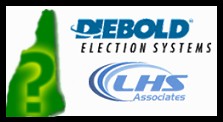 As well, concerns were expressed about the private company, LHS Associates, which oversees programming, sales, and service for all the Diebold voting machines used in New Hampshire, as well as most of the other states in New England. Concerns included the recently revealed criminal background of a senior LHS executive, Michael Hajjar, and other less-than-appropriate behavior by fellow officials at the company. The BRAD BLOG has reported on questions about LHS over the past year. We've previously detailed a number of those concerns, along with the criminal record of Hajjar, who pled guilty to narcotics trafficking in 1990. Our most recent reporting on LHS, and what seems to be inappropriate access to voting machines, and confusion concerning protocol for access to voting equipment before, during, and after elections in New Hampshire, can be found here and here.
As well, concerns were expressed about the private company, LHS Associates, which oversees programming, sales, and service for all the Diebold voting machines used in New Hampshire, as well as most of the other states in New England. Concerns included the recently revealed criminal background of a senior LHS executive, Michael Hajjar, and other less-than-appropriate behavior by fellow officials at the company. The BRAD BLOG has reported on questions about LHS over the past year. We've previously detailed a number of those concerns, along with the criminal record of Hajjar, who pled guilty to narcotics trafficking in 1990. Our most recent reporting on LHS, and what seems to be inappropriate access to voting machines, and confusion concerning protocol for access to voting equipment before, during, and after elections in New Hampshire, can be found here and here.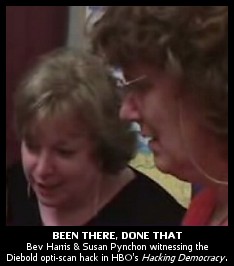 Melisa Urda, of the Illinois Ballot Integrity Project (IBIP) was with Howard throughout the day, as video cameras rolled on nearly every moment of the early proceedings, discussions, and even confrontations with SoS Gardner, and his Deputy SoS David M. Scanlan.
Melisa Urda, of the Illinois Ballot Integrity Project (IBIP) was with Howard throughout the day, as video cameras rolled on nearly every moment of the early proceedings, discussions, and even confrontations with SoS Gardner, and his Deputy SoS David M. Scanlan.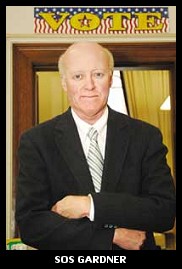 Gardner reportedly attempted to refer Howard's requests for ballot reconciliation numbers, poll book records, reported machine errors, etc., as detailed in his letter, to the Attorney General's office, suggesting the candidate was not entitled to an investigation, only to a recount.
Gardner reportedly attempted to refer Howard's requests for ballot reconciliation numbers, poll book records, reported machine errors, etc., as detailed in his letter, to the Attorney General's office, suggesting the candidate was not entitled to an investigation, only to a recount.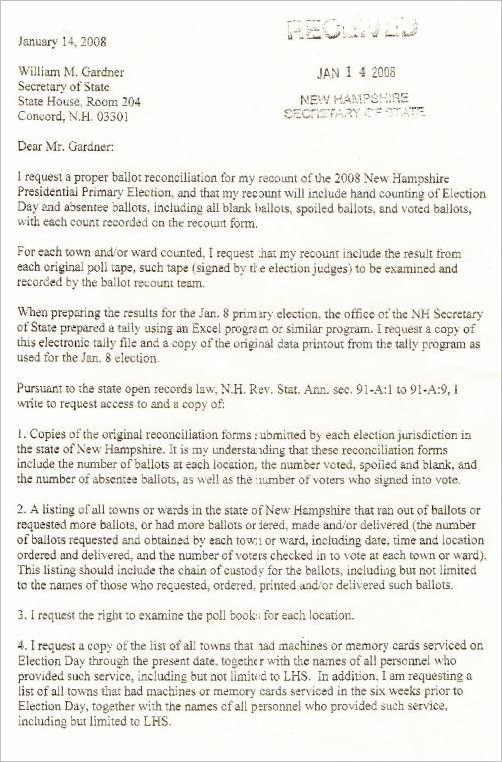

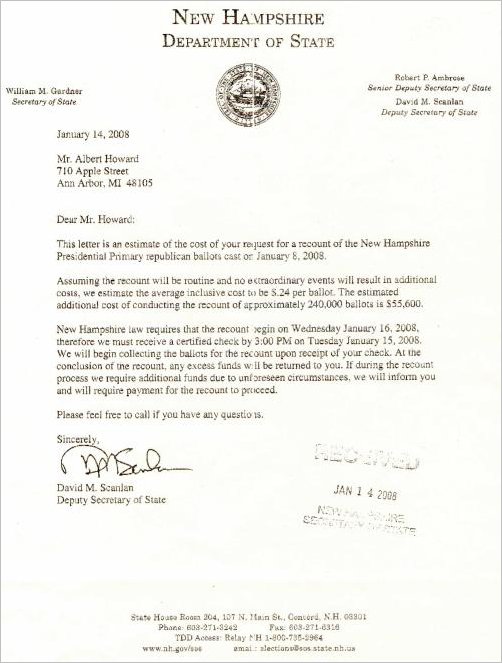


 Trump DOJ Takes Stand
Trump DOJ Takes Stand 'Green News Report' 11/13/25
'Green News Report' 11/13/25
 Mamdani's 'Surprisingly Afford-able' Affordability Agenda for NYC: 'BradCast' 11/12/25
Mamdani's 'Surprisingly Afford-able' Affordability Agenda for NYC: 'BradCast' 11/12/25 After the Shutdown and
After the Shutdown and 'Green News Report' 11/11/25
'Green News Report' 11/11/25 Victories for Democracy in Election 2025; Also: 7 Dems, 1 Indie Vote to End Shutdown in Senate: 'BradCast' 11/10/25
Victories for Democracy in Election 2025; Also: 7 Dems, 1 Indie Vote to End Shutdown in Senate: 'BradCast' 11/10/25 Sunday 'Ass Kicking' Toons
Sunday 'Ass Kicking' Toons 'We Can See Light at the End of the Tunnel' After Election 2025: 'BradCast' 11/6/25
'We Can See Light at the End of the Tunnel' After Election 2025: 'BradCast' 11/6/25 'Green News Report' 11/6/25
'Green News Report' 11/6/25 TEAM BLUE TRIUMPH! Dems Win Everything Everywhere All at Once: 'BradCast' 11/5/25
TEAM BLUE TRIUMPH! Dems Win Everything Everywhere All at Once: 'BradCast' 11/5/25  Repub Thuggery As Americans Vote: 'BradCast' 11/4/25
Repub Thuggery As Americans Vote: 'BradCast' 11/4/25 'Green News Report' 11/4/25
'Green News Report' 11/4/25 Last Call(s) Before Election Day 2025: 'BradCast' 11/3/25
Last Call(s) Before Election Day 2025: 'BradCast' 11/3/25 Sunday 'Close Enough' Toons
Sunday 'Close Enough' Toons A Pretty Weak 'Strongman':
A Pretty Weak 'Strongman':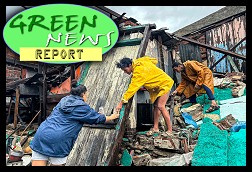 'Green News Report' 10/30/25
'Green News Report' 10/30/25 Proposal for 'Politically Viable Wealth Tax' Takes Shape in CA: 'BradCast' 10/29
Proposal for 'Politically Viable Wealth Tax' Takes Shape in CA: 'BradCast' 10/29 Monster Storm, Endless Wars, Gamed Elections: 'BradCast' 10/28/25
Monster Storm, Endless Wars, Gamed Elections: 'BradCast' 10/28/25 Let's Play 'Who Wants to Be a U.S. Citizen?'!: 'BradCast' 10/27/25
Let's Play 'Who Wants to Be a U.S. Citizen?'!: 'BradCast' 10/27/25 Exiled NOAA Scientists Resurrect Critical Disaster Database: 'BradCast' 10/23/25
Exiled NOAA Scientists Resurrect Critical Disaster Database: 'BradCast' 10/23/25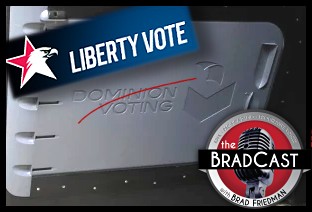 Trump-Allied GOP Partisan Buys Dominion Voting Systems: 'BradCast' 10/22/25
Trump-Allied GOP Partisan Buys Dominion Voting Systems: 'BradCast' 10/22/25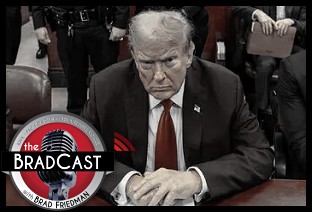 Trump, Republican Law(lessness) & (Dis)Order: 'BradCast' 10/21/25
Trump, Republican Law(lessness) & (Dis)Order: 'BradCast' 10/21/25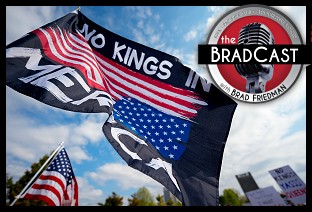 Celebrating 'No Kings': 'BradCast' 10/20/25
Celebrating 'No Kings': 'BradCast' 10/20/25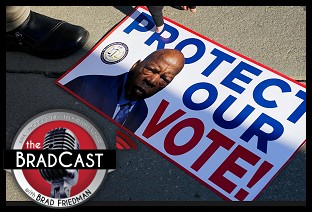 SCOTUS Repubs Appear Ready to Gut Rest of Voting Rights Act: 'BradCast' 10/16/25
SCOTUS Repubs Appear Ready to Gut Rest of Voting Rights Act: 'BradCast' 10/16/25
 VA GOP VOTER REG FRAUDSTER OFF HOOK
VA GOP VOTER REG FRAUDSTER OFF HOOK Criminal GOP Voter Registration Fraud Probe Expanding in VA
Criminal GOP Voter Registration Fraud Probe Expanding in VA DOJ PROBE SOUGHT AFTER VA ARREST
DOJ PROBE SOUGHT AFTER VA ARREST Arrest in VA: GOP Voter Reg Scandal Widens
Arrest in VA: GOP Voter Reg Scandal Widens ALL TOGETHER: ROVE, SPROUL, KOCHS, RNC
ALL TOGETHER: ROVE, SPROUL, KOCHS, RNC LATimes: RNC's 'Fired' Sproul Working for Repubs in 'as Many as 30 States'
LATimes: RNC's 'Fired' Sproul Working for Repubs in 'as Many as 30 States' 'Fired' Sproul Group 'Cloned', Still Working for Republicans in At Least 10 States
'Fired' Sproul Group 'Cloned', Still Working for Republicans in At Least 10 States FINALLY: FOX ON GOP REG FRAUD SCANDAL
FINALLY: FOX ON GOP REG FRAUD SCANDAL COLORADO FOLLOWS FLORIDA WITH GOP CRIMINAL INVESTIGATION
COLORADO FOLLOWS FLORIDA WITH GOP CRIMINAL INVESTIGATION CRIMINAL PROBE LAUNCHED INTO GOP VOTER REGISTRATION FRAUD SCANDAL IN FL
CRIMINAL PROBE LAUNCHED INTO GOP VOTER REGISTRATION FRAUD SCANDAL IN FL Brad Breaks PA Photo ID & GOP Registration Fraud Scandal News on Hartmann TV
Brad Breaks PA Photo ID & GOP Registration Fraud Scandal News on Hartmann TV  CAUGHT ON TAPE: COORDINATED NATIONWIDE GOP VOTER REG SCAM
CAUGHT ON TAPE: COORDINATED NATIONWIDE GOP VOTER REG SCAM CRIMINAL ELECTION FRAUD COMPLAINT FILED AGAINST GOP 'FRAUD' FIRM
CRIMINAL ELECTION FRAUD COMPLAINT FILED AGAINST GOP 'FRAUD' FIRM RICK SCOTT GETS ROLLED IN GOP REGISTRATION FRAUD SCANDAL
RICK SCOTT GETS ROLLED IN GOP REGISTRATION FRAUD SCANDAL VIDEO: Brad Breaks GOP Reg Fraud Scandal on Hartmann TV
VIDEO: Brad Breaks GOP Reg Fraud Scandal on Hartmann TV RNC FIRES NATIONAL VOTER REGISTRATION FIRM FOR FRAUD
RNC FIRES NATIONAL VOTER REGISTRATION FIRM FOR FRAUD EXCLUSIVE: Intvw w/ FL Official Who First Discovered GOP Reg Fraud
EXCLUSIVE: Intvw w/ FL Official Who First Discovered GOP Reg Fraud GOP REGISTRATION FRAUD FOUND IN FL
GOP REGISTRATION FRAUD FOUND IN FL

































